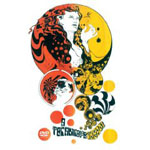|
Sixties nostalgia seen through herbal haze...

A Technicolor Dream cleverly gathers to together primary evidence as to the origins of the 60's UK underground leading up to the '14 Hour Technicolor Dream' at the Alexander Palace, as well as charting the parallel rise of Pink Floyd and the subsequent demise of its creative force Syd Barrett.
And what starts of as a retrospective documentary searching out the antecedents of the one event that all but defined the era, almost tails off in its overlong focus on Syd Barrett as a metaphor for the subsequent down side of the era. Having said that, the rather overdrawn ending is slightly offset by the bonus interviews but in the above context the inclusion of the additional (oft seen) Floyd footage appears like an add on to help sell the DVD.
Featuring music by both Pink Floyd and The Pretty Things and interviews with underground catalysts such as John 'Hoppy' Hopkins, (Barry) Miles , Joe Boyd and musicians like Roger Waters, Nick Mason, Phil May, Pete Brown and Kevin Ayers 'A Technicolor Dream' does a reasonable job in pulling together the various underground cultural strands that led to the main event at the Alexandra Palace.
And while the DVD doesn't offer any new footage of the event there's enough interesting talking heads and newsreel footage of the time to give you an insight into the changing era.
Based solely on the title of the DVD it might be argued that although Pink Floyd was at the epicentre of events, there's slightly too much attention paid to the Technicolor headliners. In the broader context of both the events and the times you do wonder why the producers didn't interview more of the musicians especially people like Arthur Brown.
As it is, both Miles and former Floyd manager Peter Jenner offer a bold enough skeletal outline of the chronology of the times to allow the images to nicely flesh out the events. And while Jenner provides the memorable quotes, such as the events of the time marked a 'break with Victorian heritage, piss off Victoria!', and the Technicolor Acid Dream was 'a celebration of the coming of age for the post war generation', it is Miles with his more considered reflections who possibly gives a truer perspective on the dynamics of the time.
The actual footage of the central event is in fact minimal, with the sheer size of the crowd being the only really striking image on offer. For his part, Roger Waters admits he can't remember much. The post event comedown is filtered through the sad demise of Syd Barrett which is probably a little too long in the context of the subject matter. Barrett is after all a well researched and frequently profiled figure. And while Jenner thought 'they' tried to shut him up, Roger Waters stays consistent in his belief that Syd was already heading towards schizophrenia with or without the use of acid.
A Technicolor Dream doesn't quite pull off what it sets out to achieve, namely the de facto story of the Underground movement in the UK in the 60's and some of the talking heads such as Kevin Ayers and Phil May add little to the feeling that outside of the personal hedonism of the hippy elite it wasn't until years after that the 'Technicolor Dream' that the real significance of the late 60's bore fruit.
****
Review by Pete Feenstra
|

